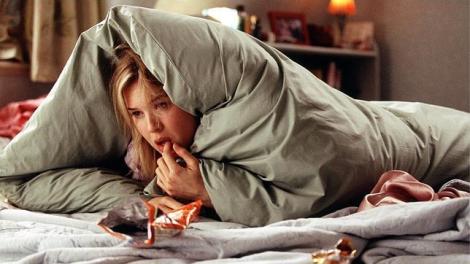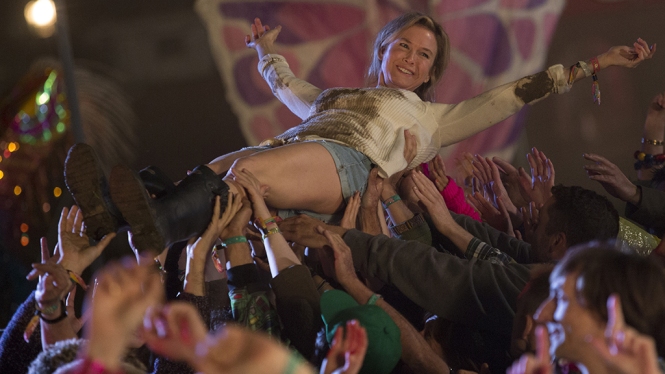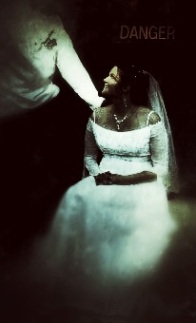 I love Bridget Jones.
I love Bridget Jones.
If I had to pick three fictional characters I most closely resemble, she’s at the top of my list.
For a chronically single 20-year-old at theatre school in London, Bridget Jones’s Diary spoke to my soul. The awkward, granny-panty wearing, overweight singleton, was the first representation of a grown woman in media I genuinely identified with. Her self reflective journaling is an unabashed lense on her world; the book was a homage to loving — and being loved for — our messy, imperfect selves.
I identified with Bridget’s constant confusion in matters of the heart, and her distaste of “smug married couples,” her desire to prioritize her friends over lovers, and her determination to define herself on her own terms, not by the relationship she was in.
I had bought into the fear of singledom, though, and at 22 married the first man I had a serious relationship with, afraid of ending up in my mid 30s, single, miserable, alone, writing in my journal, wearing granny panties.
Well, today, I’m 34, divorced, writing in my blog, and wearing granny panties. And life is good.
I took myself out for a self date tonight. It’s a little ritual I’ve fallen out of practice with. There’s something delightful about treating myself to the kind of experience I once expected from — no, pined for — from a boyfriend. I was curious: in the decade since the last Bridget Jones movie, I’d been married, miscarried twice, and now lived as a solo and polyamorous woman making her way as an entrepreneur and writer. Bridget’s life would have changed in the intervening years too, and I wondered how her path compared to mine.
I won’t give you any major spoilers, on the off chance you do go see Bridget Jones’ Baby, where our heroine once again finds herself torn on the choice between two men. However, I squealed out loud half way through when she uttered the word “polyamorous.”
One of the fictional characters who inspired my chosen form of relationships, just said the word to describe those relationships — and in a mainstream movie no less! Did I hear that right?
Media is changing. We are at a tipping point, and there’s no going back.
 As I watched Bridget progress through pregnancy, uncertain of who the father was, I saw the new paradigm begin to shine through. I saw a portrayal of two men in competition for a woman grow kinship instead of rivalry, and even express compersion in the midst of jealousy. I watched an exploration of the possibility of non-traditional family, and I smiled because Bridget beamed as she watched the two men become the closest of friends.
As I watched Bridget progress through pregnancy, uncertain of who the father was, I saw the new paradigm begin to shine through. I saw a portrayal of two men in competition for a woman grow kinship instead of rivalry, and even express compersion in the midst of jealousy. I watched an exploration of the possibility of non-traditional family, and I smiled because Bridget beamed as she watched the two men become the closest of friends.
Alas, the movie only hinted at polyamory, and while I’d like to think it helped set the stage for more unconventional storylines in the rom-coms of tomorrow, for Ms. Jones, polyamory was not to be.
It turns out Bridget went up the relationship Escalator after all, albeit in an unconventional manner, stumbling up and down (which isn’t surprising, considering her penchant for stumbling through important moments).
Meanwhile, here I am, firmly living a life bohemian and unconventional. While Bridget finally got the recognition she wanted through the relationship legitimacy she craved, I’m content to remain Solo: sharing love with my friends and my partners, no intention of childbearing. I’m a little more graceful perhaps than I was at 20, but hopefully I still have that awkward charm, loving the mess and imperfections of my life — and of course, my granny panties. I feel a small victory, being the single woman in my 30s, alone in the cinema, watching my heroine step out of her spinsterhood and onto the Relationship Escalator. I didn’t have to choose between Darcy and the other man, and the other, other man. I date them all!
I can’t help but wonder what’s next for Bridget. I have my fingers secretly crossed, that she’ll wake up one day and, true to her fiercely independent nature, realise she doesn’t need a partner to complete her. Maybe she’ll read a blog about a young divorced woman in Canada, and realise that she can be free and date and have sex with whomever there exists mutual consent, and she could actually have the best of all worlds, and not have to choose between her many male loves any more, whilst also firmly avoiding the trap of becoming part of a smug married couple.
Bridget Jones’ Polyamory? Ha. Maybe.

All images are from Bridget Jones’s Diary and Bridget Jones’s Baby, by Miramax, Studio Canal, Working Pictures, and Universal Studios, based on the character by Helen Fielding. Please go see the movie: http://www.bridgetjonesmovie.com/





